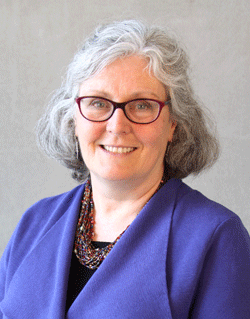 |
|
|
Patricia Franklin, MD, MBA, MPH |
The U.S. Food and Drug Administration has recruited UMass Medical School’s Patricia Franklin, MD, MBA, MPH, to help the agency determine how mobile health apps and wearables can be used to evaluate the performance and safety of implantable medical devices. Dr. Franklin was invited to be a member of The Mobilizing mHealth Innovation for Real-World Evidence Generation working group, convened by the FDA and the Duke Margolis Center for Health Policy, for her expertise in patient-reported outcomes following total joint replacement surgery and implant surveillance.
“Going direct to patient is a philosophy the FDA is fully embracing, and they’re focusing on apps as the future for enacting it,” said Franklin. “They came to us because our research is proof of principle that, regardless of medium used, patients are a great source of letting us know what’s going on with their implants.”
Franklin, professor of orthopedics & physical rehabilitation, is principal investigator for a national total joint replacement database called Function and Outcomes Research for Comparative Effectiveness in Total Joint Replacement (FORCE-TJR.) Initiated in 2011 with a $12 million grant from the federal Agency for Healthcare Research and Quality, FORCE-TJR is the most comprehensive U.S. database on total hip and knee joint replacement patients, capturing their levels of pain and function since their surgeries.
“While FORCE-TJR is about data, the workgroup is about methods,” said Franklin. “What do we know about apps, what we don’t know about apps, and how can they do what we did for the last five years without paper and email?”
The FDA is also keenly interested in the Franklin team’s ongoing work to develop an app to help arthritis patients and clinicians track their progress before and after a total knee replacement. In a pilot project that is also funded by AHRQ, Hua Zheng, PhD, assistant professor of orthopedics & physical rehabilitation at UMMS and Bengisu Tulu, PhD, assistant professor of management and research fellow of the Kay Center for E-Health Research at Worcester Polytechnic Institute, used input from patient and clinician focus groups to refine the design and content of the app to make it both useable and useful. Next, they will test the resulting app in actual clinical settings.
“We now use email, web, paper, telephone—but we will use apps when they’re ready,” said Franklin. “It is energizing to see that rapid changes in technology can help put the whole picture together in ways that we can’t do now.”
Read the Mobilizing mHealth Innovation for Real-World Evidence Generation working group white paper to learn more and see the Sept. 15 public announcement for Franklin’s full comments.
Related stories on UMassMedNow:
Telegram, Associated Press report on UMMS study on success of joint replacement among overweight patients
Study finds obese patients don’t need to lose weight before total joint replacement
New, evidence-based tool to help osteoarthritis patients decide on hip, knee replacement
Boston Globe: UMMS research offers guidance for ideal timing of hip, knee replacements
New medical research targets best time for joint replacement surgery